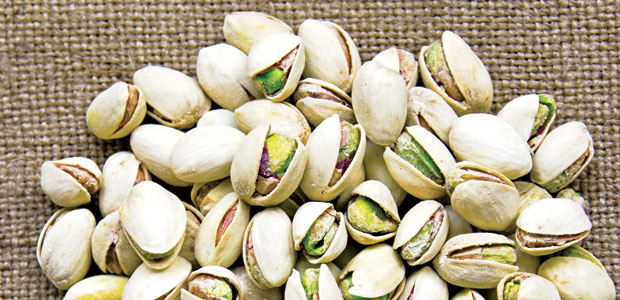Advertisement
P-nuts! Get Your P-nuts!
Pecans and pistachios - the new superfoods

Peanuts are undoubtedly the most popular nuts in North America, but the latest research suggests there are two other “p-nuts”—pecans and pistachios—which may be the healthiest players in the “shell-game.”
Pecans
Renowned for their rich, buttery taste, pecans are regarded by most people as a sinful indulgence rather than as a health-enhancing superfood. If you’re among this majority—think again. Pecans contain more than 19 vitamins and minerals including vitamins A and E, folic acid, calcium, magnesium, phosphorus, potassium, several B vitamins, copper, and zinc. And their nutritional potency doesn’t end there.
According to a 2004 government report, pecans are the most antioxidant-rich tree nut and are among the top 15 foods to contain the highest antioxidant capacity. Not surprisingly, a recent study showed that eating pecans increases blood levels of disease-fighting antioxidants. Antioxidants act as bodyguards for your cells. They neutralize the cell-damaging free radicals that can cause disease and accelerate aging.
Heart healthy
If you’ve been shunning pecans because of their high fat content, consider this: the majority of fat in pecans is the heart-healthy monounsaturated variety. This fat helps protect good HDL cholesterol while wiping out the bad LDL cholesterol that clogs arteries.
But there’s more than monounsaturated fat at work to protect your ticker: pecans also contain plant sterols and fibre—compounds that have both been shown to lower cholesterol levels. The evidence is irrefutable; a recent study showed that eating pecans can lower LDL cholesterol by as much as 33 percent!
Neurological support
Here’s another compelling reason to make pecans a part of your diet. A study published in Current Topics in Neutraceutical Research showed that eating a handful of pecans daily may help stave off age-related motor neuron degeneration.
The study, which involved feeding neurologically impaired mice varying amounts of pecans—or no pecans at all—clearly demonstrated the scrumptious nut’s ability to protect the neurological system. All of the mice that ate pecans had less of a decline in motor neuron function compared to those who received no pecans. And the mice that ate the most pecans had the best results of all.
Pistachios
Legend has it the Queen of Sheba valued pistachios so highly she decreed them an exclusively “royal food.” As nutty as this seems today, it’s not surprising the Queen took pistachios so seriously—mounting evidence suggests pistachios may be one of the healthiest foods you can eat.
The little nut delivers a nutritional punch that belies its size. Pistachios are an excellent source of potassium, thiamine, vitamin B6, copper, manganese, phosphorus, vitamin E, and fibre. They also contain ample amounts of magnesium, folate, iron, and zinc.
But what makes pistachios unique among nuts is the fact that they are also loaded with antioxidants normally found in vegetables: the carotenoids beta carotene, lutein, and zeaxanthin. Lutein and zeaxanthin protect your vision, and studies show they may aid in reducing the risk for macular degeneration, which is one of the leading causes of blindness in the elderly.
Their carotenoid colleague, beta carotene, has been shown to have anticancer properties. A new study done at the University of Texas showed that eating 2 oz (56 g) of pistachios daily could help lower the risk for lung cancer.
Heart friendly
Pistachios can do a lot more than keep your baby blues sharp and ward off cancer. A recent study found that munching on them can lower blood pressure during times of stress. Lower blood pressure has been linked to a reduced risk for heart disease and stroke. Other studies have revealed pistachios can also lower cholesterol and reduce triglycerides.
Weight watchers
Perhaps the most surprising health benefit attributed to pistachios is their ability to help us stay trim. Researchers have discovered that eating pistachios increases levels of the satiety hormone, ghrelin. Translation: eating pistachios helps keep hunger at bay and stops you from reaching for that pre-dinner candy bar!
In addition, a new Canadian study showed that when pistachios are eaten with high-carbohydrate foods they actually help slow the absorption rate of carbohydrates into the body, keeping blood sugar levels on an even keel. Furthermore, another recent study found that obese participants lost more weight and had healthier triglyceride levels when pistachios were added to their portion-controlled diets.
Where to buy
Both pecans and pistachios are available year-round and can be bought at health food stores, supermarkets, and natural food retailers. If you’re purchasing them from a bulk-food bin, make sure the bin is covered and that the store has good product turnover. If you’re buying shelled nuts, inspect them for moisture or insect damage and avoid nuts that appear shrivelled.
Storing nuts
Shelled nuts fare best when stored in airtight containers in the refrigerator and will last for three to six months (pistachios are better eaten closer to the three-month mark). Shelled nuts can also be frozen and will stay fresh for up to a year and a half. You can thaw and refreeze frozen nuts without losing flavour or texture. In-shell pecans will keep fresh for up to a year if stored in a cool, dry cupboard. In-shell pistachios should be kept in the fridge and are best eaten within six months.
How to use
Both pecans and pistachios can be used in a variety of sweet and savoury dishes or eaten out of hand as a healthy snack. There are many tasty ways to include them in your meals. Try them combined with dried fruits in grain pilafs, tossed into salads, crushed for use as crusts for fish or chicken filets, added to yogourt or baked goods, as a garnish for soups, or in creamy custards or ice cream!
Recipes




